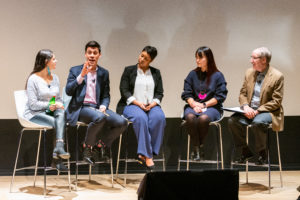Why Workers Want to Have an Impact Beyond Profits


The voices crying out for corporate responsibility in the community are louder and more plentiful than ever in 2020, and companies big and small are starting to respond. But what is the best approach for corporations, and who decides how much is enough? In a panel discussion at a recent From Day One conference in Seattle, a panel of local experts sought to answer that question.
“I think we all know that focusing on values as well as making money is not only good for the bottom line, it’s good for the employees and for the community, your home,” said panel moderator Herb Weisbaum, a KOMO Radio reporter and NBCnews.com contributor, setting the stage for the conversation.
Rebekah Bastian, VP of community and culture for Zillow Group, said the sense of community starts at home, within the walls of the company. “[We’re] focused on creating a workplace where all of our employees have equitable opportunities to grow and thrive in their careers, and a sense of belonging where they feel like they can bring their best selves to work, and they’re really seen and heard and valued for the unique perspectives that they bring,” she explained. From there, Bastion said that Zillow then has the goal of merging the internal culture with the product side, so that employees can see how their work is having a positive impact on the community around them.
Focusing on motivation, Mark Horoszowski used a story to illustrate why he co-founded MovingWorlds, a company whose stated mission is to “build leaders and doers behind grassroots, world-changing ideas.” He mentioned the phenomenon of window washers dressing up like superheroes that office workers (and kids in children’s hospitals) sometimes see on the outside of their windows, and how much joy they bring–and often introspection. “Everybody in your company’s looking outside, then the Spider-Man goes [by], then everyone is wondering ‘What am I doing here? I’m doing hard, smart-person work, but what’s the effect of that? The window washer just brought joy into my life, but what am I doing?’”

This, Horoszowski said, is why MovingWorlds was created: to help find ways for employees to know that the work they’re doing has an impact and a purpose, that “they are contributing to something bigger than themselves.” The MovingWorlds platform helps companies connect their employees with meaningful projects around the world that utilize their skills in impactful ways.
Cassandra Mitchell, VP and corporate-responsibility officer for KeyBank, brought another angle to the discussion, since banks are bound not only by an internal sense of responsibility but also government rules and regulations for financial institution. Her role chiefly entails finding and connecting with nonprofits in the local community to take on worthwhile projects. Naturally, her responsibility includes focusing on ways to help increase financial literacy, but also to take on some of the most pressing challenges facing the Seattle area, including the need for more affordable housing. “We want to make sure we’re serving the underbanked and underserved,” she explained. Beyond that, Mitchell said that she tries “to find partners who are innovative, different, but really an expert in their field.”
Kim Vu, global head of diversity, equity and inclusion for Remitly, described her relatively young company as “a digital platform that provides financial solutions that allows people to send money to their families across the globe.” Remitly’s social responsibility is inherent in its mission, she said, because it serves a unique, beneficial purpose in the world. “Social impact and thinking about that mission-driven purpose of our work, it’s built into what we do in equity and financial systems, it’s built into what we do on a daily basis,” Vu explained.
Horoszowski said he is impressed that much larger companies, including financial giants like BlackRock and Goldman Sachs that are taking a high-profile stand on issues like climate change. “These are companies that are saying, ‘Let’s not do some harm and cover it up with some good.’ These are companies that are saying let’s use our assets to create some good and minimize harm in the process.”
Weisbaum asked the panelists, “Is it enough to just enable workers or do [companies] need to put their money where their mouth is?” Mitchell stressed that those are two sides of the same coin, that employees should be able to feel comfortable in their workplace to speak out and enact change, but companies should also support those ideas financially. “It’s a combination of walking the talk, having a board of directors that is holding everyone accountable, and if it doesn’t happen, you’ll see it,” she said.
Bastian agreed, but noted that the reverse of Weisbaum’s question should also be considered: “Is it OK, or enough, for a company to be writing a check, even a big check, or many big checks, if the employees aren’t engaged in doing the work?” She said that having a company write those checks can potentially let employees feel like they’re “off the hook” in terms of social responsibility and don’t have to do the work themselves to make things happen.
Horoszowski looked to the future and suggested that big things can happen if companies accept that change is coming to the global economy and its relationship to the workplace. What does that mean, in concrete terms? “I don’t have an elegant answer, and I’m biased here, but employees within companies do.” If companies can find ways to let their employees be creative and do meaningful work, solutions to some of these large-scale problems may come naturally.
Spenser Davis is a Seattle-based writer who has contributed to VICE, Pacific Standard, Atlas Obscura and other publications.
The From Day One Newsletter is a monthly roundup of articles, features, and editorials on innovative ways for companies to forge stronger relationships with their employees, customers, and communities.